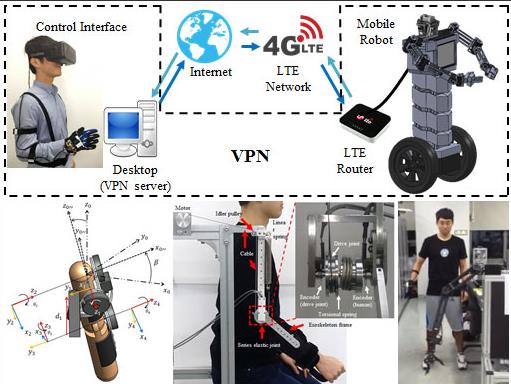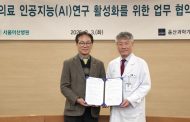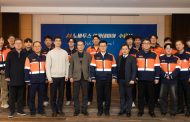A research team, led by Professor Joonbum Bae of Mechanical, Aerospace and Nuclear Engineering has recently been honored by the Minister of Science, ICT and Future Planning (MSIP) of Korea.
Professor Bae and his research team received the MSIP Minister Prize and 100 million won in research funds at the final competition for the 2017 Future Growth Engine: Challenge Demo Day on March 30, 2017. They award was given in recognition of their groundbreaking project in building a humanoid robot for disaster response, also known as the AVATAR (interActive and intuitiVe control interfAce for a Tele-operAted Robot) System.
Professor Joonbum Bae’s AVATAR system has won the MSIP Minister Prize at the 2017 Future Growth Engine: Challenge Demo Day on March, 30, 2017.
The Challenge Demo Day is designed to empower and support new technology-based startups and to create new job opportunities. This is also the final stage for the ‘Flagship Project on Future Growth Engines’, which supports the demonstration of new technology-based business items.
The final competition of the 2017 Challenge Demo Day proceeded in an open competition manner that was publicly demonstrated and evaluated in front of the experts and public.
Their AVATAR robotic system has been highly evaluated for its emergency response capability, as well as its commercial potential in the development of 4D virtual reality contents through wearable system.

A tele-operation system where robot hand replicates human hand motion, and feeback algorithm betweem the robot and the human.
“Our AVATAR system, like robots and virtual reality, has a great ripple effect as the core technology of the future growth engine of the nation,” says Professor Bae. “This award has given UNIST a chance to showcase AVATAR robot’s high technical and business skills.”
Their introduced AVATAR robot system is comprised with a wearable part capable of mapping human motions, and receiving or passing the information required for driving the robot, as well as a dual-arm robot that moves autonomously using four wheels. When a controller wears and moves in this motion-sensing robotic suit and gloves, the dual-arm robot replicates the user’s hand motion, and feedback algorithm between the robot and the human.
Moreover, such wearable parts and robots can be remotely controlled via bi-directional communication using LTE (Long Term Evolution) wireless communication method. In fact, on the final day of the competition, a controller at UNIST (Ulsan) remotely operated the AVATAR robot in Gwacheon National Science Museum (Gwacheon, Gyeonggi-do).
“We are currently developing a wearable system, capable of performing various and precise remote operations, and a four-legged robot, capable of running on rough surfaces,” Professor Bae. “Using the artificial intelligence technology, we hope to build robots that can one day make their own decisions.”
A total of 57 teams participated in this year’s Challenge Demo Day competition and 6 teams were selected as the finalist, including UNIST. The Prime Minister Award went to the Smart Recycle Bin, developed by the local SME, SuperBin.







![[2026 Matriculation] UNIST Welcomes Class of 2030!](https://news.unist.ac.kr/wp-content/uploads/2026/02/사진-박종래-UNIST-총장이-2026년-입학식사를-전하고-있다-2-190x122.jpg)
![[2026 UNIST Commencement] UNIST Confers Degrees to 883 Graduates](https://news.unist.ac.kr/wp-content/uploads/2026/02/사진-2026학년도-UNIST-졸업생들이-학사모를-위로-던지며-졸업을-축하하고-있다-1-800x413-190x122.jpg)



